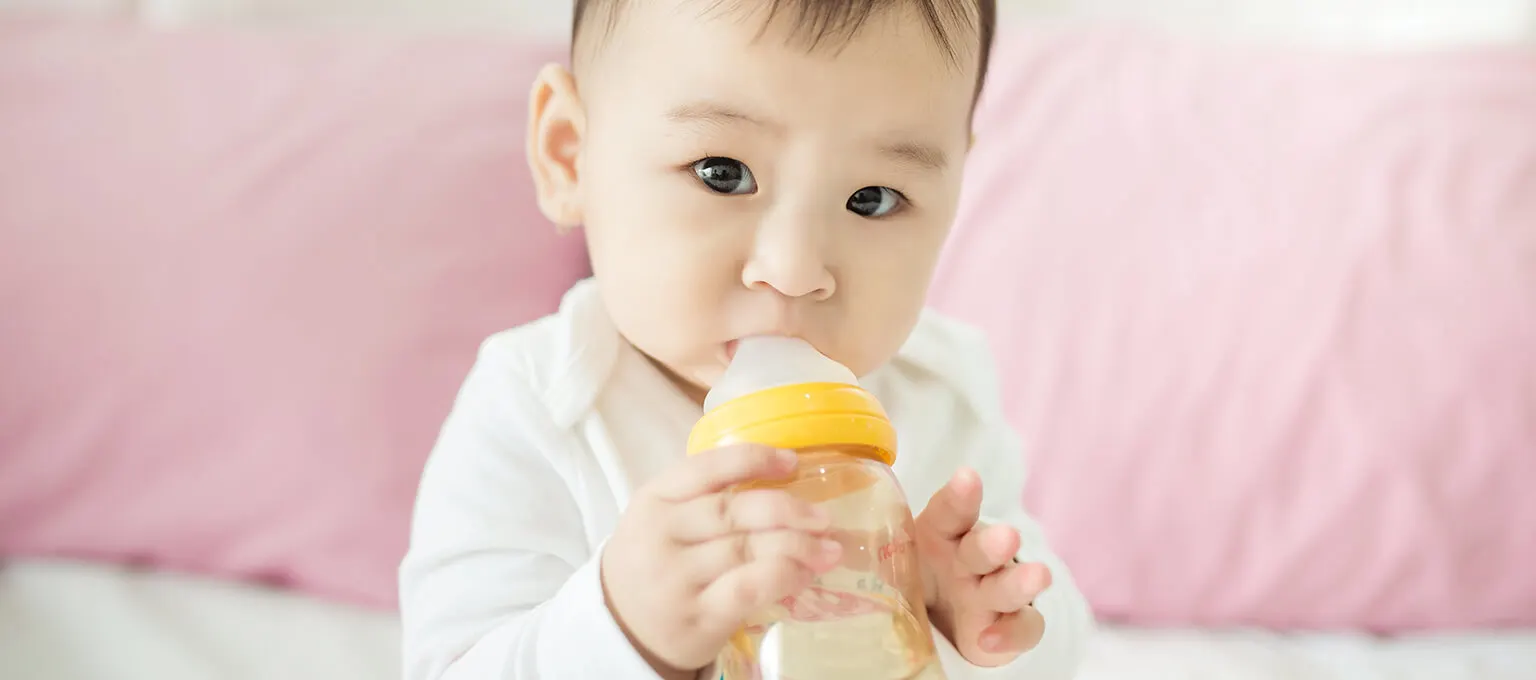Dehydration in Babies: Prevention, Symptoms, and Treatment
As a parent, you want to do everything possible to keep your baby healthy. Even so, babies and young children do get sick from time to time, and with certain symptoms of illness like fever or vomiting, there's a chance that your baby or toddler can get dehydrated. It’s important to try to keep your baby from getting dehydrated, so read on to find out more about what exactly dehydration is, what can cause it, how you can prevent it, and what to do if your baby does become dehydrated.
What Is Dehydration?
Our bodies need water and other fluids to function properly—that goes for babies, children, and adults, too. Over the course of a day, it’s normal for your baby to lose and replenish water. When your little one sweats, cries, pees, or poops, they lose water, and when they feed, eat, or drink, they replenish it.
Dehydration can occur when your baby or toddler loses a significant amount of body water. When the fluids aren't immediately replaced, this can lead to a number of serious conditions, including
heatstroke
seizures
kidney failure
loss of consciousness
a drop in oxygen levels.
Signs of Dehydration
The signs of dehydration you might see in your baby or toddler depend on the level of dehydration they might have.
Signs of Mild to Moderate Dehydration
The following are signs of mild to moderate dehydration in children:
Playing less than usual
A dry mouth
Peeing less frequently (in toddlers) or fewer than six wet diapers in a day (in babies)
Crying fewer tears
Sunken eyes
Sunken fontanelles (the soft spots on your baby's head)
Looser stools if the dehydration is caused by diarrhea, or fewer stools if the dehydration is caused by vomiting or drinking less fluid.
If your baby shows any of the above signs, call their healthcare provider immediately. The provider can give you instructions as to what can help treat the dehydration, such as a store-bought electrolyte solution.
Signs of Severe Dehydration
Signs of severe dehydration include:
Fussiness
Excessive sleepiness
Severely sunken eyes
Cold and discolored hands and feet
Wrinkly skin
No wet diaper in an 8-hour period (in babies); not peeing in a 10-hour period (in toddlers).
If you think your baby may be severely dehydrated, take them to the emergency room. Your baby may need to be rehydrated intravenously and this requires hospitalization.
Treatment
The goal in treating your child's mild to moderate dehydration at home is to rehydrate them right away by replenishing the fluids that they have lost. Always check with your child's healthcare provider if you have any questions about appropriate home treatment.
For Infants and Young Babies
If your baby is breastfeeding, continue to nurse in order to rehydrate them, unless they're vomiting. If that's the case, hold off on breastfeeding. Your provider will likely recommend that you give your baby a commercially available electrolyte solution in between the feedings and will tell you how much and how often to offer this.
If you're feeding your baby with formula, you'll want to stop and simply rehydrate them with only the electrolyte solution until they are able to hold the fluids. Afterward, you can go back to formula-feeding. Don't water down the formula.
It's important to note that it's not recommended to give water to babies under 6 months old, so don't treat the dehydration with water.
For Older Babies and Toddlers
Check with your child's healthcare provider, who may recommend using a readily available store-bought electrolyte solution manufactured for babies and toddlers.
Follow the provider's instructions on dosage. These solutions are usually given in small, frequent doses.
Some things that you shouldn't give your older baby or toddler when they're dehydrated include:
Water
Soda, including ginger ale
Tea
Fruit juices
Gelatin desserts
Chicken broth.
These items do not offer the necessary sugars and salts that your child needs. And, if your child is dehydrated due to diarrhea, these items can make it worse.
Causes of Dehydration
Dehydration often occurs when children have diarrhea, vomiting, a fever, or heat illness, including sunburn.
Diarrhea
An occasional loose stool is nothing to be worried about, but sometimes your baby or toddler may get diarrhea due to common viral illnesses such as the flu. When diarrhea strikes, important minerals and salts are also lost along with water through your child's stools, and this can lead to dehydration.
If your baby or toddler has watery stools every few hours, call their healthcare provider as soon as you can. The provider may advise that you avoid giving your child any solid foods for 24 hours, and have you instead give a store-bought electrolyte solution.
Vomiting
Many illnesses, including the stomach flu, can cause vomiting, which in turn can lead to dehydration. To prevent dehydration from occurring, it's important to ensure that your child is getting extra fluids. If they continue to vomit up the fluids, contact your healthcare provider for advice on next steps.
An important thing to note: In the first 24 hours of your child vomiting, keep them from eating solid foods. Instead, have them drink or suck on a store-bought electrolyte solution.
Fever
A fever (a temperature of 100.4 degrees Fahrenheit or higher) can also cause dehydration, as it results in a child losing fluids more quickly. The higher your child's fever, the more dehydrated they can become. This is why it's important that your child gets extra fluids if they have a fever.
Sunburn and Heat Illness
Severe sunburn and extreme exposure to hot weather and heat can also lead to dehydration. If your child has severe sunburn or is suffering from heat-related illness, call their healthcare provider and head to the emergency room.
Signs of severe sunburn can include:
Blisters
Fever
Chills
Headache
General ill feeling
Fainting
Dehydration.
When to See Your Child's Healthcare Provider
If your child doesn't improve from the above at-home treatment measures—for example, if they still have very bad diarrhea or are vomiting often, even after you've given them the electrolyte solution—notify their healthcare provider and take them to the emergency room. They may need to get intravenous fluids in a hospital setting.
Of course, if you ever suspect your little one may be dehydrated and are unsure about how to treat it, get in touch with your baby’s healthcare provider as soon as possible for personalized advice.
Preventing Dehydration
Whenever your child is sick with an illness that causes fever, diarrhea, or vomiting, it's really important that they get plenty of fluids to keep them from becoming dehydrated. If your baby is under 6 months old, give them extra breast milk or formula, since water is not recommended for babies this young. If your child is showing mild signs of dehydration, a store-bought electrolyte solution can help ensure that they’re rehydrating with the correct balance of salts and sugars, especially if the dehydration is caused by diarrhea.
If you are outside on a hot summer's day with your child, stay in the shade whenever possible. You'll also want to make sure your little one is protected from the sun with a wide-brimmed hat and loose, lightweight cotton clothing with long sleeves, along with baby sunscreen. These steps can help protect your baby from sunburn and dehydration.
It's also important to keep your baby hydrated before they even start to get thirsty. So, if you're outside, ensure that you have liquids on hand.
The Bottom Line
Now that you know what to look for, you'll be able to recognize the signs of dehydration if they occur and start treating your baby right away. But, of course, it’s safest to prevent your little one getting dehydrated in the first place, so make sure your baby is getting plenty of fluids if they’re ever sick or outside on a hot day.
Have you heard of the Pampers Club app? Join today to start earning points for all the diapers and wipes you buy. Then turn those points into discounts! Plus, in the app, you can read up on baby development topics as your little one grows.
How We Wrote This Article The information in this article is based on the expert advice found in trusted medical and government sources, such as the American Academy of Pediatrics and the American College of Obstetricians and Gynecologists. You can find a full list of sources used for this article below. The content on this page should not replace professional medical advice. Always consult medical professionals for full diagnosis and treatment.
Join a World of Support
through Pregnancy and Parenthood.
TRACK WITH TOOLS
LEARN WITH EXPERTS
GET REWARDED












